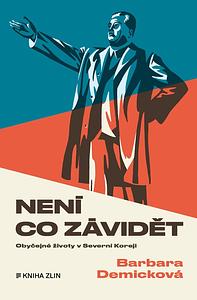You need to sign in or sign up before continuing.
Take a photo of a barcode or cover
What an amazing peek at the mysteries of what daily life is actually like in North Korea. The most recent spurt of news on this hermit kingdom made me eager to learn more, and this wonderfully engaging oral history of six individuals who defected from North Korea was really illuminating. Barbara Demick is a journalist for the LA Times and spent years in candid interviews with these six (and more), as they shared their obedience to, then slowly dawning disillusionment with their homeland preceding their defection. This is a straightforward and moving piece of journalism, similar to The Spirit Catches You and You Fall Down by Ann Fadiman, and it reads like adventuresome dystopian sci-fi.
emotional
informative
reflective
sad
medium-paced
I'd give it 4.5 stars. It was almost life changing. Definitely illuminating and heartbreaking. We all need to know what's going on in North Korea.
See life in North Korea through the eyes of people who were able to flee, and learn about their difficulties in adjusting to life in a free society. A compelling read.
dark
emotional
informative
sad
medium-paced
dark
emotional
hopeful
informative
sad
medium-paced
A shocking and fascinating read. Demick details the lives of several North Koreans during the totalitarian regime of Kim Il-Sung and Kim Jong-Il. I was in utter disbelief at the misery these people had to endure at the hands of the state. The citizens are brainwashed from birth and kept in the dark, literally and figuratively, from the outside world. It’s hard to say what shocked and saddened me the most about the lives of each person detailed. From imprisonment and hard labor for the slightest infraction to famine and lack of medical care for the children and elderly. Demick made her career as a journalist and this is apparent in her writing style. Many sections read like long articles, but I didn’t find this to be a negative as Demick returned to each person’s tale. I found each person’s story to be compelling in its own way and by the end was truly uplifted by their eventual defections.
I read this with my book club. It's one of those books I wouldn't have picked up on my own, and I'm glad to have had it shoved in my face. It's far from perfect, and not what I'd call a pleasant read, but I did learn a lot.
The book follows the narrative of several people who escaped from North Korea, and their various reasons why they risked imprisonment to leave the only homes they'd ever known. The author calls them "defectors," which I suppose is accurate, but I saw them as refugees, escaping for better lives elsewhere.
I knew precious little about Korea, approaching this book. All I knew was that my sister is currently posted in Seoul, and her family lives there with her. I knew about the US military presence, and I had a vague idea it had something to do with communism.
Nothing to Envy certainly clarified why we're still there. North Korean forces staying on their side of the 38th Parallel is important. We do not want to risk the spread of conditions in North Korea.
The conditions described in the book are rather like 1984, down to the attitude that Russia has always been their enemy, after they'd been allies for decades. ("We have always been at war with Eurasia.") People are watched, their diaries read, and children are taught from a young age that they should turn in their neighbors and friends. The three-generation rule ensures that those who want to rebel keep it quiet, to keep their parents and children from suffering their punishment.
North Korea is so much worse, though. During the famine of the 1990s, various aid groups sent food to help the populace. Most of it went to those in power, or was sold at exorbitant cost on the black market. Conditions in the prisons are worse than bleak, hunger being the only force keeping prisoners from acting out even worse than here in the US. The book describes people stepping over those who've died of starvation in the streets. One woman, a doctor, escapes to China and finds a feast just lying in someone's front yard. It's only when she hears barking that she realizes dogs in China eat better than doctors in North Korea.
The book has a clear political slant, though. It's puzzling, how many pages are spent slamming communism. We already know how easy it is to exploit, and that it doesn't work in practice. The book really loses me, though, when it posits that capitalism has none of the problems of greed, corruption, and starvation, because we fixed it through regulation. I urge the author to take a look at our current political and financial climate, and talk to some recipients of school lunch programs.
The book also reads like a series of articles, loosely stitched together with very little editing. Passages are repeated, often word for word, while context is sometimes lacking. The narratives can be hard to keep track of. While they do all highlight different aspects of life in North Korea, it can be hard to tell within the context which person is being described at any given moment. There are sometimes hints, but not enough.
Overall, reading this book was an eye-opening experience. I learned a lot about North Korea, and about how powerful propaganda and cultural pressure can be in bringing people in line. I finished up this book a lot prouder of my sister for her role in South Korea, helping to maintain the military presence that keeps North Korean forces on their side of the border.
The book follows the narrative of several people who escaped from North Korea, and their various reasons why they risked imprisonment to leave the only homes they'd ever known. The author calls them "defectors," which I suppose is accurate, but I saw them as refugees, escaping for better lives elsewhere.
I knew precious little about Korea, approaching this book. All I knew was that my sister is currently posted in Seoul, and her family lives there with her. I knew about the US military presence, and I had a vague idea it had something to do with communism.
Nothing to Envy certainly clarified why we're still there. North Korean forces staying on their side of the 38th Parallel is important. We do not want to risk the spread of conditions in North Korea.
The conditions described in the book are rather like 1984, down to the attitude that Russia has always been their enemy, after they'd been allies for decades. ("We have always been at war with Eurasia.") People are watched, their diaries read, and children are taught from a young age that they should turn in their neighbors and friends. The three-generation rule ensures that those who want to rebel keep it quiet, to keep their parents and children from suffering their punishment.
North Korea is so much worse, though. During the famine of the 1990s, various aid groups sent food to help the populace. Most of it went to those in power, or was sold at exorbitant cost on the black market. Conditions in the prisons are worse than bleak, hunger being the only force keeping prisoners from acting out even worse than here in the US. The book describes people stepping over those who've died of starvation in the streets. One woman, a doctor, escapes to China and finds a feast just lying in someone's front yard. It's only when she hears barking that she realizes dogs in China eat better than doctors in North Korea.
The book has a clear political slant, though. It's puzzling, how many pages are spent slamming communism. We already know how easy it is to exploit, and that it doesn't work in practice. The book really loses me, though, when it posits that capitalism has none of the problems of greed, corruption, and starvation, because we fixed it through regulation. I urge the author to take a look at our current political and financial climate, and talk to some recipients of school lunch programs.
The book also reads like a series of articles, loosely stitched together with very little editing. Passages are repeated, often word for word, while context is sometimes lacking. The narratives can be hard to keep track of. While they do all highlight different aspects of life in North Korea, it can be hard to tell within the context which person is being described at any given moment. There are sometimes hints, but not enough.
Overall, reading this book was an eye-opening experience. I learned a lot about North Korea, and about how powerful propaganda and cultural pressure can be in bringing people in line. I finished up this book a lot prouder of my sister for her role in South Korea, helping to maintain the military presence that keeps North Korean forces on their side of the border.
dark
informative
sad
medium-paced


